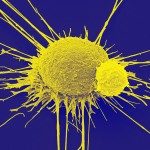Lien vers Pubmed [PMID] – 10485651
Immunity 1999 Aug;11(2):163-71
The in vivo differentiation of CD4 T cells from naive to memory cells was followed after their adoptive transfer together with syngeneic dendritic cells into MHC mismatched adoptive hosts lacking lymphocytes and NK cells. Functional and molecular changes were measured as the antigenic stimulus, provided by the cotransferred dendritic cells, disappeared. Memory cells as opposed to effector cells show an inversion in the relative expression of Bcl-2 family members in favor of antiapoptotic molecules, and compared with naive cells they have an increased ratio of bcl-xL to bcl-2. They differ qualitatively from naive T cells, suggesting that accelerated CD4 memory responses can occur without the need for increased frequencies of specific T cells.


